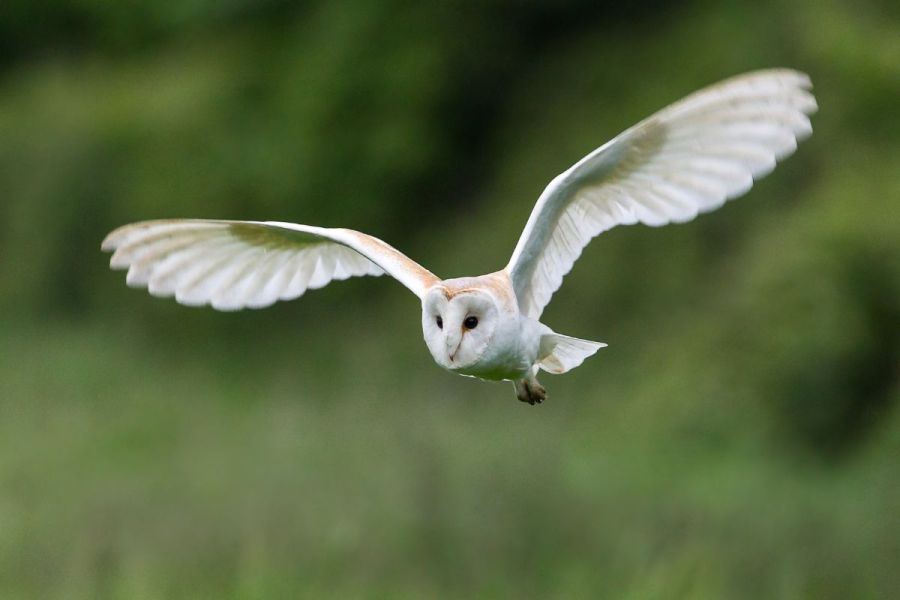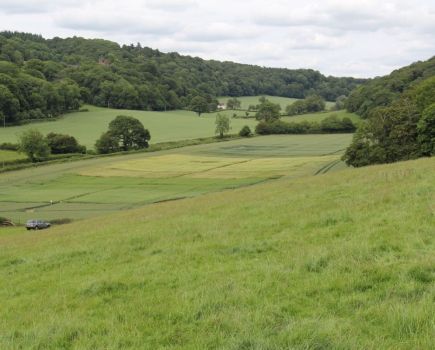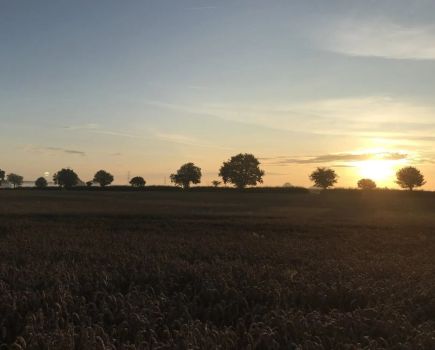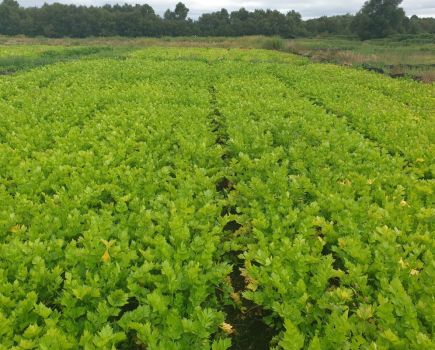The depletion of farmland birds is often in the headlines but the success stories, where birdlife has been restored, seldom make the news. We take a look at a farming business that has developed a ‘nature-first’ brand, adding value to its produce and enhancing both biodiversity and birdlife on the farm in the process.
“Targeted activities that take into consideration the needs of the different local species have allowed life on the farm to thrive.”
By Lucy de la Pasture
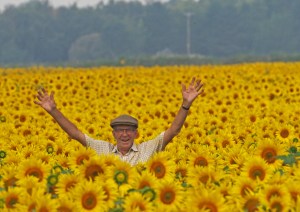
Vine House Farm has been committed to wildlife conservation and conscious farming since 1992, when Nicholas Watts noticed farmland bird numbers were declining as the farm grew.
Vine House Farm has been committed to wildlife conservation and conscious farming since 1992, when Nicholas Watts noticed farmland bird numbers were declining as the farm grew. Though conservation started for Nicholas as a personal project to bolster bird numbers while he worked, the efforts have embedded themselves into the foundation of their business.
From what started as simply recording breeding pairs of birds, the team’s efforts have developed and numerous changes have since been implemented that have allowed them to support and protect their local wildlife while also maintaining a profitable business. His efforts were recognised in 2006 when Nicholas was awarded an MBE for his work in conservation and farming.
Spanning 1400 hectares, the Vine House Farm estate includes the farm itself and three other local farms managed by Nicholas and his family. He has worked at the farm since 1966 and has since been joined by son-in-law Robert Golland and daughter Lucy Taylor, who operate as farm manager and manager of the bird seed business respectively.
Through the farm itself – the grower of Britain’s largest sunflower farm for bird seed (see CPM’s May issue, page 56), the Farm Shop and Café and the online bird seed business, Vine House Farm engages with its local community as well as bird lovers across the country.
How it started
According to the family, although their actions were initially influenced by their own observations of how farming has impacted their ecosystem, it’s now also driven by wider environmental awareness. Since they have established practices to support local wildlife, they have been able to turn their attention to the operation and management of the farm and its building to reduce their environmental impact while maintaining efficiency and profitability.
Following 10 years of data on bird numbers on the farm, Nicholas started planning changes that would help build numbers again, implementing processes that have created nesting and feeding opportunities, as well as enriching the farm and its operations. “We’ve seen an increase in bird numbers, including a rise in tree sparrow numbers from around five breeding pairs in 2006, to around 130 breeding pairs in 2017,” he explains.
The farm has 26 kilometres of six-metre-wide field margins that are full of perennial native wildflowers such as cowslip, knapweed, musk mallow, ox eye daisy and lady’s bedstraw. Around 10 kilometres of native hedgerows have also been planted, including double hedging 10 metres apart with wildflowers grown between, and 12 wildflower meadows – totalling eight hectares – are also present across the estate. These actions have resulted in more insects for birds to feed on, as well as nesting opportunities in the hedgerows, explains Nicholas.
Ponds have been dug on the land, with the largest containing a small island specifically designed to encourage nesting for moorhens, common terns, lapwings, oystercatchers, redshanks, black-headed gulls and tufted ducks.
Renovating old redundant farm buildings and the creation of five brick towers has aided in habitat preservation for kestrels, tree sparrows and stock doves but especially barn owls, with the population going from four pairs back in 1985, to an average of 12 in recent years.
“These targeted activities that take into consideration the needs of the different local species have allowed life on the farm to thrive, while still being closely monitored and continuing to support the bird seed business,” he adds.
Building community
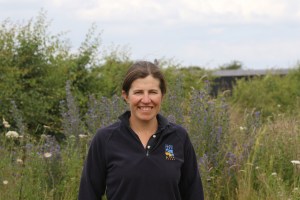
Having a brand which is underpinned by strong conservation and environmental credentials has unquestionably benefited the business financially, says Lucy Taylor.
Manager of the bird seed side of the business, Lucy Taylor, believes that all these activities not only support the farm’s bird population but have allowed the farm to develop a nature-first brand that resonates with its audience both in the local community and country-wide.
“It’s hard to quantify the financial impact of our conservation overall. Certainly, for the bird food and the Farm Shop and Café elements of our wider business, having a brand which is underpinned by such strong conservation and environmental credentials has unquestionably benefited us financially. This is because it helps us differentiate our offer, and in a way that is increasingly relevant to consumers in a fast-changing world,” she says.
The bird seed side of the business has allowed Vine House Farm to develop their relationship with The Wildlife Trusts and the team has raised over £2.3m for The Wildlife Trusts, with money from every online sale contributing, adds Lucy.
“The relationship really has its roots in Nicholas being a long-term member of Lincolnshire Wildlife Trust. We wanted to share our financial success to widen our conservation aims – with The Wildlife Trusts being the obvious choice. The relationship is very partnership-based and allows us to market to Wildlife Trust members. So, it works for everyone.”
The farm itself is also used to share the message of conservation with its visitors. This includes a Wildlife Garden, which showcases some of the farm’s wider work and is aimed at both an enjoyment and educational level. This garden helped the farm achieve the RHS Britain in Bloom East Midlands – Best Commercial Premises 2022 award, evidencing the commercial and social value conservation brings to Vine House, believes Lucy.
Children visiting the garden can take part in various hunts, depending on the season, and are given prizes such as sunflower and tree planting kits in biodegradable pots to extend their learning beyond their visit and encourage them to think of ways to support wildlife from home.
“For our customers across the UK who shop with us online or order over the phone, the main way they now engage is through social media and specifically Facebook. This platform allows us to post news stories about conservation measures and success stories, which followers can then engage with through comments and sharing with friends. “
Conservation contributions
In January, the government announced a raft of new incentives for farmers to improve the environmental impact of their farms. This is intended to work in conjunction with the current initiatives and aims to improve efficiency and reduce costs.
Within this, the government is targeting pest management and the presence of nectar-rich wildflowers for birds and insects. Nearly 1900 farmers already make use of the incentives and accelerating the initiative will no doubt contribute towards greener farming practices across Britain.
However, there’s room for improvement with these initiatives, believes Lucy. She says that Vine House Farm has made use of the government’s incentives and will be reviewing how the new measures will help it save money and improve efficiency, but she believes that these incentives don’t go far enough.
“There are some very good initiatives here and there will no doubt be a greater uptake nationally. For those that have already been following the schemes, they appear to be easily transferable so that is another strong point. Food for farmland birds is also identified as important, which is excellent news.
“We believe there will be greater uptake by farmers. However, it must be said that several of these initiatives do not pay financially on the most productive land in the UK, such as Lincolnshire and Cambridgeshire.
“It will be down to the farmer wanting to do their bit, rather than making black-and-white financial sense. Here at Vine House Farm, we do what we do environmentally because of our love and commitment to wildlife. It helps that we get paid some money for what we do, but it doesn’t cover all our costs.
“As many people are aware, supermarkets are squeezing many of their suppliers so hard at present, especially in the fresh produce world. Farmers struggle for every penny to produce food profitably, forcing many to give up initiatives that they may otherwise have done if they were in a better position financially,” she warns.
“This isn’t the case for everyone, of course, but may be enough to discourage some farmers who would benefit greatly from the implementation of these processes.”
For Vine House Farm, the government’s incentives are a supplement, not a necessity, she adds. “In the case of many other farms that have yet to fully dedicate themselves to conservation in their work, the incentives may not be enough to encourage them to make the necessary changes as the financial benefit may not be present.
“Even with this new set of incentives, conservation is still a personal responsibility, rather than an operational one, leaving room for non-compliance. The UK is not currently on track to meet the climate targets it has set and actions like this that don’t properly incentivise farmers could cost the country environmentally further down the line.”
This article was taken from the latest issue of CPM. For more articles like this, subscribe here.
Sign up for Crop Production Magazine’s FREE e-newsletter here.

